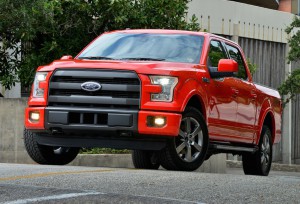
New vehicle buyers are favoring trucks and utility vehicles, which is cutting the average fuel economy rating for new vehicles.
Courtesy of low gas prices, U.S. consumers continue to plunk down cash for trucks and utility vehicles in increasing numbers over more fuel efficient small cars, and in the process, drive down the average fuel economy of vehicles in this country.
The gas mileage rating of new vehicles purchased by American consumers slipped last month, according to researchers at the University of Michigan Transportation Research Institute (UMTRI). The average fuel economy printed on the window stickers of cars, light trucks, vans and SUVs purchased in June was 25.4 mpg, down from 25.5 mpg in May, the U-M researchers said.
“The decline likely reflects the increased sales of light trucks and SUVs in June,” according to Michael Sivak, a research professor at UMTRI.
Overall, fuel economy is up 5.3 mpg from October 2007, the first full month of monitoring by Sivak and colleague Brandon Schoettle. But the gains have become a lot slower in the past year.
(GM takes on Ford F-150 in new web campaign. For more, Click Here.)
In addition to average fuel economy, Sivak and Schoettle issued a monthly update of their national Eco-Driving Index, which estimates the average monthly emissions generated by an individual U.S. driver. The EDI takes into account both the fuel used per distance driven and the amount of driving — the latter relying on data that are published with a two-month lag.
(Click Here for details about how Mercedes turns shoppers into buyers better than anyone.)
During April, the EDI rose to 0.85 – the lower the value, the better – its worst mark since December 2011. However, the index currently shows emissions of greenhouse gases per driver of newly purchased vehicles are still down 15% overall, since October 2007.
(To see more about Honda’s turnaround plan, Click Here.)
But the gain reflects the shift to larger and heavier vehicles that burn slightly more fuel than passenger cars. Through the first six months of the year, passenger car sales have dropped 1.7%, while sales of trucks and utility vehicles have increased by 10.3%, according to AutoData.
